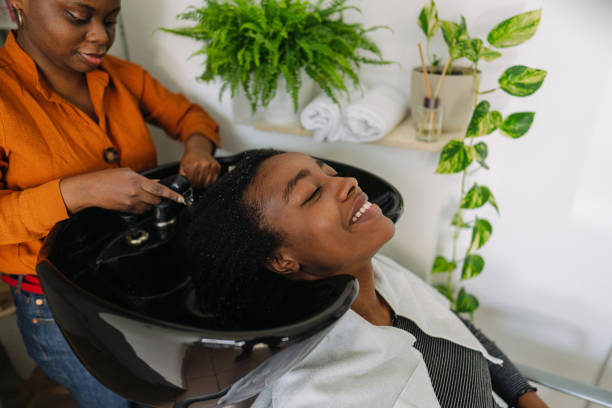(Akiit.com) In December 2022, the Modernization of Cosmetics Regulation Act (MoCRA) was adopted as part of a larger congressional spending package, significantly bolstering the FDA’s leverage in the beauty industry. Notably, this is the first major overhaul of cosmetics regulations since the Food, Drug, and Cosmetics Act of 1938 and the Fair Packaging and Labeling Act of 1966.
While MoCRA is widely regarded as a long overdue and vital improvement, several of its provisions are insufficiently defined or phrased in a manner that would inadvertently permit manufacturers to continue using carcinogenic ingredients in their product formulations. These inconsistencies have more profound implications for African American women, with recent studies highlighting the concerning links between hair straighteners and a host of gynecological cancers.

Carcinogens in Hair Relaxers
A 2022 NIH study found that frequent use of hair-relaxing products was positively correlated with increased uterine cancer (UC) risks. Women who used such products more than four times a year displayed a UC incidence rate (4.05%) that was more than double that of non-users (1.64%).
The study’s authors analyzed nearly 11 years’ worth of data on approximately 34,000 women (ages 35 to 74) participating in the more expansive Sister Study. None of the other tested products registered similar correlations.
Since 2012, multiple clinical studies have also indicated that regular hair relaxer use is linked to higher risks of gynecological afflictions, including uterine fibroids, endometriosis, and breast and ovarian cancer. These adverse effects are believed to result from exposure to endocrine-disrupting and carcinogenic chemicals commonly found in hair products, such as parabens, phthalates, bisphenol A, formaldehyde, or lye (sodium hydroxide).
UC is the most prevalent reproductive cancer (second only to ovarian) affecting US women, with 66,200 diagnoses and 13,030 fatalities projected in 2023. Although not as common as other cancers, research has noted that African American women are more prone to developing aggressive types of UC, representing 60% of individuals who reported habitual hair relaxer use.
The health disparities in UC outcomes for Black women, including higher death and lower survival rates, are more pronounced in states like North Carolina, where these discrepancies are accentuated across racial lines.
African American women encounter distinct social pressures to conform to Eurocentric beauty norms that favor straight hair, potentially incurring higher exposure rates if they begin applying chemical relaxers at young ages. At the same time, personal choices in terms of hair fashion can also contribute to frequent use. More importantly, cosmetics companies have sought to capitalize on such considerations by increasingly marketing their hair straightening products toward the Black female demographic.
MoCRA’s Loopholes
Before MoCRA’s adoption, the FDA relied on manufacturers voluntarily complying with requests to remove products when their safety was reasonably questioned, even when extensive contamination was evident. The recent legislative update authorizes the FDA to issue mandatory recalls and establish federal standards for the cosmetics industry.
Moreover, manufacturers will be legally obliged to register their production facilities, implement “good manufacturing practice” standards, improve ingredient labeling, keep records on and expedite the reporting of adverse events, and provide product safety substantiation. In spite of these progressive developments, a few of the Act’s provisions cast doubts over its ability to ensure consumer protection effectively.
Although cosmetics manufacturers will be required to provide ingredient disclosures to the FDA, they’re not automatically beholden to making such information available to consumers. Additionally, these disclosures apply only to “allergens,” seemingly disregarding more potent hazards like PFAS or phthalates. In the past, unscrupulous manufacturers attempted to keep toxic ingredients confidential by claiming they were trade secrets, generically labeling them as “fragrance” or “perfume.”
The most contentious issue concerning MoCRA is the ambiguously defined provisions that outline adequate safety substantiation. In its present form, the Act would unwittingly allow manufacturers to submit product safety determinations drafted by organizations whose corporate funding generates obvious conflicts of interest. The implications gain an even more alarming dimension since MoCRA doesn’t mandate premarket notifications or require cosmetic products to undergo review and approval before they make it onto store shelves.
Developing Litigation and Future Improvements
Although commendable in scope, MoCRA’s limitations remain problematic for vulnerable individuals that report higher exposure rates to the toxins it’s supposed to regulate. One study focusing on hair products used by African American women found that all tested samples contained “fragrances,” over 75% contained parabens and phthalates, over 80% of identified toxins weren’t listed, and products targeted at children had the highest amounts of 5 hazardous chemicals outlawed in the EU or stringently regulated under California’s Proposition 65.
Weeks after the 2022 NIH study was published, leading cosmetics manufacturers found themselves entrenched in a growing tide of litigation. The first claim was filed by Jenny Mitchell (32), a Black woman from Missouri who alleges that her regular use of chemical hair relaxers since the age of 8 was responsible for her UC diagnosis and subsequent hysterectomy at 28.
Although defendant companies disputed the accusations, the Judicial Panel on Multidistrict Litigation moved to centralize all claims in a class-action lawsuit in the Northern District Court of Illinois. To streamline the process, Judge Mary M. Rowland recently allowed future plaintiffs from around the country to file their claims directly in the MDL via a short-form complaint.
While the legal battle can last for years, the FDA can reduce customers’ justified anxieties by correcting MoCRA’s problematic inconsistencies, leveraging its newly acquired attributes to mandate improved reporting transparency, and setting clearly defined product safety substantiation standards that leave no room for disingenuous interpretation.
In the meantime, Black women who are looking for natural hair relaxer alternatives can access Environmental Litigation Group P.C’s Toxic Hair Relaxer Replacement Campaign here to request free samples from ethical manufacturers.
Written by Jonathan Sharp
About the Author
Jonathan Sharp is the CFO of Environmental Litigation Group PC, a Birmingham, Alabama-based law firm specializing in toxic exposure cases, which helps individuals who were injured by hazardous chemicals and adulterated consumer products.









Leave a Reply